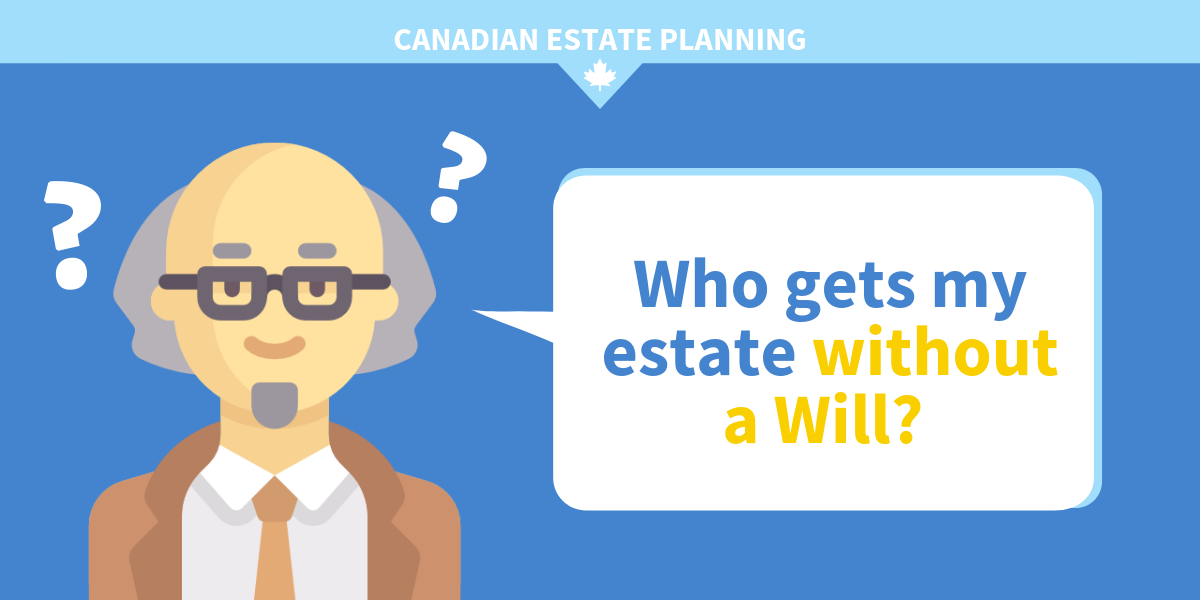
“A surprising 51% of Canadians have an estate without a Will.”
Angus Reid Institute
Why are so many of us neglecting this important part of planning for our future? And what happens to an estate when it doesn’t have a Will or Executor to direct it?

No matter how busy we get, how much money we have, or how old we are, having a Will and Estate Plan are more important today than ever.
With so much dependence on technology, ensuring someone can get access to your accounts and assets (digital or otherwise) is critical. New trends every year change the way our estate needs to be handled, from cryptocurrency to will planning apps.
Remember, your executor will probably be a loved one and you don’t want to leave them with a frustrating mess. Continue reading to learn what happens to Canadians without a will and the steps you can take to make sure your estate ends up in the right hands.
Estate Without a Will: How is it distributed?
According to Ontario provincial law, when you die, your estate is covered by the Succession Law Reform Act. This act clearly displays the line of succession in case of an untimely death.
If you failed to produce a will before your death, you can expect the following items to be distributed accordingly:
- If you have no children and are married, your spouse will receive your entire estate.
- If you are not married and have no children, your estate will be distributed to your closest living blood relatives. The following would become the distribution hierarchy: Parents > Siblings > Nieces & Nephews.
- If you are married and have children, your spouse will receive the first $200,000 of your assets. The remainder of your estate will be divided between your spouse and children. However, this will vary according to how many children you have.
- Lastly, if you have no next of kin, your estate will be given to the Crown. This means that your property will become the Crown’s property, which is an extremely rare occurrence.
It’s important to note that common-law spouses have no claim to an estate.
After the procedure of death, the law will follow specific steps regarding who is to receive the estate. It should also be noted that without a will, estate distribution will often cause feuds within the family.
Prince’s Estate Battle: An Example for Canadians
To gain a better understanding of what estate distribution looks like without a will or estate plan, we can look at Prince’s estate battle as an infamous example:
- When Prince died on April 21, 2016, he not only left a $200 million estate behind, he also left it without a will or estate plan.
- Since his death, it has taken approximately one year just to determine the beneficiaries – which at one point totalled 29 people claiming the inheritance.
- Throughout the course of litigation, the judge had declared that Prince’s six siblings were the legal heirs of his estate.
- Since then, further disputes have erupted causing more delays in Prince’s siblings’ inheritance, and they still have not received it to this day over two years after his death.
- Due to the many disputes and legal fees involved, there is serious concern that there will be no inheritance left to distribute by the time all is resolved.
While the average Canadian estate is under $3,000,000 (by no means as large as Prince’s) this is still a clear example of how relationships can be ruined and estate property can fall into unwanted hands without a plan.
Are you one of the Canadians that don’t have a Will?
Get started now by downloading our complimentary Will Preparation Guide or browse our full resource library here.
More Questions?
Who should I choose as my Executor?
How can I protect my family and my Executor?
What is an Estate Services Plan?
4 Need-to-Know Dangers of Late Life Will Changes
Will Planning Tool to Streamline Your Plan
